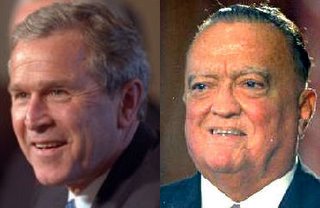. . . in the theater.
Guess that movie.
Give up? Here's a clue. Picture John Cusack looking tired, depressed, and constipated. Need help?

I didn't realize that the movie's title,
Must Love Dogs, was a metaphor. Right from the opening frames, you know you're in trouble. The screenwriter, filching from
When Harry Met Sally, opens with a few lifeless interviews of folks talking about how they meet people of the opposite sex. The humor ranges from strained to painful. Fortunately, the editor must have realized this because a few seconds later, we are thrust into some unnamed family gathering in which protag Diane Lane's relatives try to fix her up. She's newly divorced, or widowed, or slow. I'm not sure which, because the screenplay lost me that fast. I think that's a new personal record: two minutes into the movie, and I'm already telling Karen, "Let's give it 'til Cusack shows up, okay?"
Once again, the editor reads my mind, and in the very next scene we find John Cusack (also recently divorced -- and I only remember that because he's talking to his divorce lawyer in this scene) waxing poetic over his wooden boats. Except that, no matter how hard Cusack and the screenwriter struggle, dammit, Cusack looks pained to be here. Boat-splinters up every fingernail pained, that's how pained.
Less than five minutes into the movie, and we're already popping out the DVD. If you don't believe my review,
read the opinion of someone who sat through the whole thing.
On to DVD number two.
Unlike
Must Love Dogs,
The Baxter sinks its hooks into you right from the first few lines. We're given the set-up, and indeed the ending, in the first scene: Elliot (played by writer and director Michael Showalter) is a Baxter. That's what his mom called the bland, generically nice guys whom women dump in order to run off with dashing, handsome, dangerous types like this guy:

That's
Justin Theroux, who plays Bradley, Elliot's chief rival for the affections of Caroline (Elizabeth Banks). (Yes,
after watching The 40-Year-Old Virgin, I had to watch another Elizabeth Banks movie.)
Caroline dumps Elliot at the altar in the first minute of the movie, and what's left -- nearly the entire movie -- is back story. That's not supposed to work, but it does.
What amazes me the most is that this works despite the fact that Elliot is not a likable guy. He's a geeky, stuffy Ivy Leaguer who rapidly shifts romantic gears from his new temp Cecil (
Michelle Williams, cute and vibrant despite the fugly hair style) to new client Caroline. He's a heel, really, and it's hard to see what Caroline or Cecil see in him.
I gave this a lot of thought, afterwards. Why does
The Baxter fly and
Must Love Dogs sink? What it comes down to is personality, or soul. Watching
The Baxter, I could sense that Showalter had thrown himself into the creation of this movie. Arguably, he threw a little too much of himself into the movie, since his performance is the weakest of the crew. Hard not to imagine what someone else,
anyone else, would have done with that role.
Whereas, watching
Must Love Dogs, I felt that the writers had reduced movie romances to their formulaic roots, then plugged in new values for the variables Mad Lib-fashion to come up with what can only be called, not a film, but a 'product.'
***
I've read precious few romances, so it's always a magic act for me to write a Smart Bitches Day post for
Beth. Watching these two movies (okay, okay, so
really I only watched one of 'em . . .) I decided that I had something important to say about the act of writing in general, and of writing romance in particular. Here, let's put it in bold face for emphasis:
Genre formula alone might give you a sale, but it won't guarantee fine work.
Yuck. Negative declarations have such little aphoristic heft. Lemme try again:
To create a work with soul, you have to bleed a bit of yourself into the page.
A bit vampiric, but I think it captures what I'm trying to say.
Warning: this bleeding business can be overdone. Watch out that you don't create autistic prose (stories that provide you with an intense emotional experience; meanwhile, the rest of your readers scratch their heads and say, "Huh?") Like any diary, cathartic writing is best left under lock and key.
You know what I think our goal as writers should be? Our bare minimum, "at least I've accomplished this much," D minus, thank-the-Lord-I've-passed, goal? That our readers will come away from the novel (short story, poem, movie) never once questioning the fact that an
individual wrote this, a human being, not a committee, or a software package, or a crew of monkeys typing typing typing.
Although, some days I suspect the monkeys could do a better job.
D.
 I'd hate to plot this on the same scale as the YesButNoButYes gang's graph, but I'm happy with it, just the same.
I can't remember why or how I started Shatter (AKA Balls and Walnuts). Who turned me on to Blogger? I'm far too much of a technological nincompoop to find something like that on my own.
Blogging gives me the illusion of writerly discipline. Look at me, I'm writing every day -- sometimes two or three times a day! Perhaps I had hoped that discipline would carry over into my more serious literary pursuits, but it hasn't. If I had channeled all of this effort into my manuscript, I would have finished it months ago.
But then I wouldn't have met all of y'all.
My first real post (April 9) concerned my short story, "My Troll Lover", which reminds me: damn, that's a fine story. I really ought to buff it and send it out. Again.
The big traffic bump in May came courtesy of John Scalzi. What amazed me, though, was the way my June traffic didn't fall back to April levels. Smart Bitches didn't discover me until July, so I really can't account for my June numbers.
The rest of the growth I attribute to regular posting, persistent schmoozing, and shameless Technorati blogwhoring (my bloggenitals were particularly sore in October). Don't know if I can continue this growth rate, but you know something? I don't care. I'm having fun, and I like my gang of readers.
Happy New Year, everyone.
D.
I'd hate to plot this on the same scale as the YesButNoButYes gang's graph, but I'm happy with it, just the same.
I can't remember why or how I started Shatter (AKA Balls and Walnuts). Who turned me on to Blogger? I'm far too much of a technological nincompoop to find something like that on my own.
Blogging gives me the illusion of writerly discipline. Look at me, I'm writing every day -- sometimes two or three times a day! Perhaps I had hoped that discipline would carry over into my more serious literary pursuits, but it hasn't. If I had channeled all of this effort into my manuscript, I would have finished it months ago.
But then I wouldn't have met all of y'all.
My first real post (April 9) concerned my short story, "My Troll Lover", which reminds me: damn, that's a fine story. I really ought to buff it and send it out. Again.
The big traffic bump in May came courtesy of John Scalzi. What amazed me, though, was the way my June traffic didn't fall back to April levels. Smart Bitches didn't discover me until July, so I really can't account for my June numbers.
The rest of the growth I attribute to regular posting, persistent schmoozing, and shameless Technorati blogwhoring (my bloggenitals were particularly sore in October). Don't know if I can continue this growth rate, but you know something? I don't care. I'm having fun, and I like my gang of readers.
Happy New Year, everyone.
D.





 I didn't realize that the movie's title,
I didn't realize that the movie's title,  That's
That's 



 actress
actress 
















